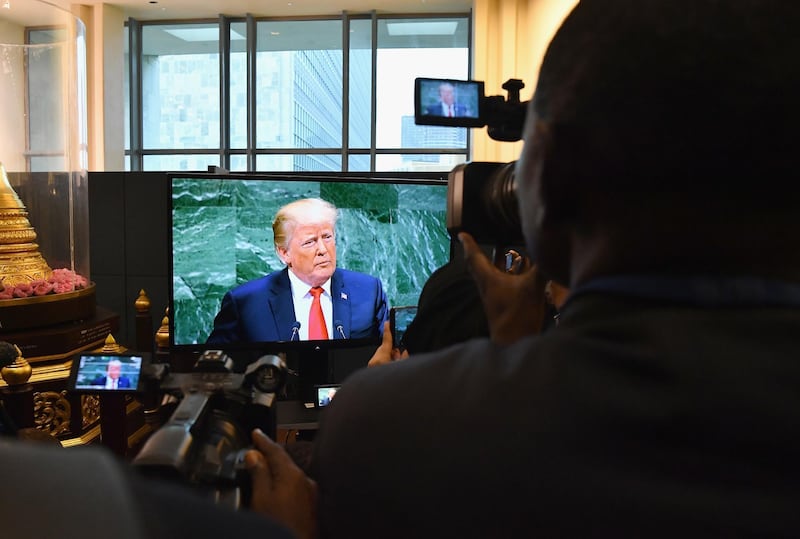President Donald Trump spoke of the “tremendous burden” Iran’s neighbours have borne for its regional aggression as he put his campaign against the Tehran regime at the heart of his second address to the United Nations.
In an address that highlighted passion for national sovereignty, prosperity and pride, Mr Trump confronted nations from China through Iran and Venezuela, as well as parts of the United Nations system itself. The US leader was late arriving at the UN headquarters, an unprecedented situation that meant Ecuador spoke before America. It did not take long to get to the heart of his message. "America is governed by Americans," he said. "We reject the ideology of globalism and we embrace the doctrine of patriotism."
Alongside this broad theme, the “campaign of economic pressure” against the Tehran regime featured just as prominently. Speaking of his decision to withdraw the US from the “horrible Iran deal”, he said that it had delivered a windfall for Iran’s leaders with its military budget growing 40 per cent after it came into effect.
Other speakers disagreed with the US line, with Turkey’s President Recep Tayyip Erdogan saying he rejected the decision to choose economic confrontation over talks with Tehran. He also launched a broadside against the dominance of the five veto-wielding nations of the Security Council within the UN system. “The UN Security Council that does not represent the entire world cannot establish justice.”
President Emmanuel Macron of France took a stand for a two-state solution to the Middle East peace process, a term not mentioned by Mr Trump.
In a swipe at the White House efforts to produce its own peace deal, he said “unilateral initiatives” will not bring peace. His address sought to reinforce the traditional pillars of western strategic policy. “I believe in universal values and that’s what should guide us.”
Praising the great strides and historic changes across the Gulf countries, Mr Trump confirmed that the US was seeking to build on the fight against terrorism and extremism that he had witnessed on his visit to Saudi Arabia last May.
According to the speech, the US is working with the Gulf Co-operation Countries, Jordan and Egypt to form a regional strategic alliance.
Mr Trump described the continuing heart-breaking Syrian conflict and called for a reinvigorated UN-led peace process. Singling out the Jordanian efforts to cope with the displacement caused by the fight, he said Amman had displayed the most compassionate approach to refugees.
Economic issues in the speech dealt with “fair but reciprocal” trade and the rising price of oil. He said America stands ready to export its abundant energy around the world and was not going to put up with higher prices much longer.
The overall goal was that Iran’s eventual nuclear ambitions would be checked. “We cannot allow the world’s leading sponsor of terrorism to possess nuclear weapons,” he said. “Just can’t do it.”
The countries listening were urged to support Iranian people as they recover their religious and righteous destiny.
Mr Trump said Iran has to change its tune before he would meet his Iranian counterpart, Hassan Rouhani.
For his part Mr Rouhani said a meeting could take place only when there would be a purpose in talking.
_______________
Read more:
[ Donald Trump and Hassan Rouhani set for UN clash ]
Anwar Gargash: Arabs must be at table in any new Iran negotiations
WATCH: New Yorkers navigate extra security for UN General Assembly
[ New Zealand PM brings baby daughter to UN General Assembly ]
_______________
The Iranian president told CNN that Mr Trump’s decision to leave the 2015 nuclear agreement left no options for an improvement in relations.
The US president has ordered his officials to make preparations for direct talks with Iran on a treaty to transform the relationship.
Mr Trump said his administration had achieved more than almost any administration in history. He said America was booming like never before. He highlighted record military spending and the start of construction of a border wall.
Boasting that America was smarter, safer and richer than it ever was before, the US leader drew laughter from the assembled delegations.
In contrast to a year earlier there was plenty of praise aimed at North Korea, which he said had joined him in a bold and new push for peace. In 2017 he had derided Kim Jong-un as little rocket man but on Tuesday thanked him for his courage.
Turning to China, Mr Trump said he would never allow America’s wealth to be plundered and destroyed and that market distortions could no longer be tolerated.
The challenge from Mr Macron to Mr Trump’s vision ranged as widely as the US leader’s address, taking on climate change and the sovereignty philosophy espoused by the Trump White House.
“In the 21st century, we should only triumph through bolstered multilateralism,” Mr Macron said. “My point is: I don’t believe in generalised or empty globalisation. I don’t think this can be a reality. But I believe in universal values. That’s what should guide us. Those are two different things.
“Even in the face of certain nationalism, which we are seeing today, brandishing sovereignty is a way of attacking others. Here today, even those who might criticise it, we have all benefited from the way global order is structured around globalisation.”






